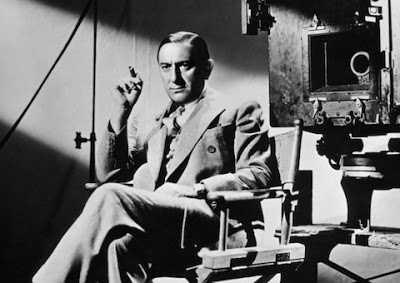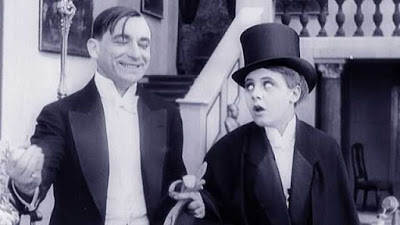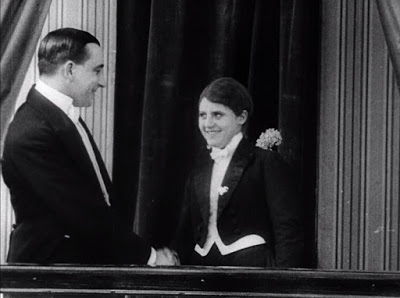This film was directed by Ernst Lubitsch near
the end of World War I - a rather bleak time for Germany with massive deprivations
and even starvation - but films were still being made. He was one of the lucky
ones because he was ineligible for the German army. His father had migrated
to Germany from Russia in the mid-1880's but his citizenship was always Russian
and this passed down to Ernst and therefore he was not allowed in the military.
Not that he had any great desire to go. His real nationality was show business.
To entertain. His father became a reasonably successful tailor and clothing
retailer and it was expected that Ernst would follow him into the family
business. Ernst had other ideas.

Though a not a particularly attractive man - all his life he complained
that he always looked fatter than he felt and a face that the great writer
Ben Hecht described as "the dark, mocking leer of a creditor" - nor very
tall, Lubitsch still wanted to be an actor in the theater. He went after
this feverishly taking any role no matter how small - often being stuck in
Jewish stereotypical roles or even creating a black face character - he was
eventually accepted into the Max Rhinehart Theater group. Rhinehart was the
premier impresario in Berlin producing all sorts of plays from Shakespeare
to comedies. Many of Germany's finest actors of the silent era learned their
craft under Rhinehart as well as two future directors who would become famous
- Lubitsch and Murnau.

Lubitsch got larger roles, began to direct plays and eventually moved into
film both as an actor and a director. As an actor he had been best at comedy
and he was to direct many comedies but at the beginning he alternated between
light comedies and large scale historical epics such as Sumurun, Anne Boleyn
and Loves of a Pharaoh. I Don't Want to be a Man though is a lovely light
comedy giving hints of what would later on when he moved to Hollywood be called
The Lubitsch Touch. Elegant, sophisticated, verbally witty adult comedies.
Even back here he did not depend on pratfalls and slapstick as so many comedies
did but it was more situational comedy. In this film there is a lot of dialogue
(with intertitles of course) and you can sense Lubitsch just straining at
the leash of film's limitations.

I have my doubts if this film could have passed the censors in the USA of
the 1930's. It is a wonderful gender mash mix-up that brings to mind much
later films like Victor/Victoria or from Hong Kong the brilliant He's a Woman,
She's a Man. Ossi (played by Ossi Oswalda, one of Lubitsch's favorite actresses),
is a young woman who enjoys playing poker, smoking and drinking - all things
as her Governess tells her a proper lady can not do. She seethes from frustration
and when her uncle has to leave for a work assignment out of the city she
dances for joy - but not for long as she is appointed a Guardian (Curt Goetz)
who promises to tame her and make her feel this small as he lowers his hand
far below his waist.

So of course she does the natural thing - dresses up as a man in a tuxedo
and goes to a ball - where she is set upon by rapacious women - not so much
the Belle of the Ball, as the Balls of the Belles. And then she spots her
Guardian who thinks she is a man - Ossi tries to take away a woman he is interested
in and later they get drunk together and begin to make out. A lot. They somehow
end up in each other's beds in each other's house and the Guardian doesn't
seem at all upset when he wakes up to realize that the night before he was
kissing a man. But also pleased to find out it was Ossi. In Berlin at the
time I expect this wasn't at all shocking with their cabarets and many homosexual
bars - but in America it might have been a different story. Only 45 minutes
in length.






